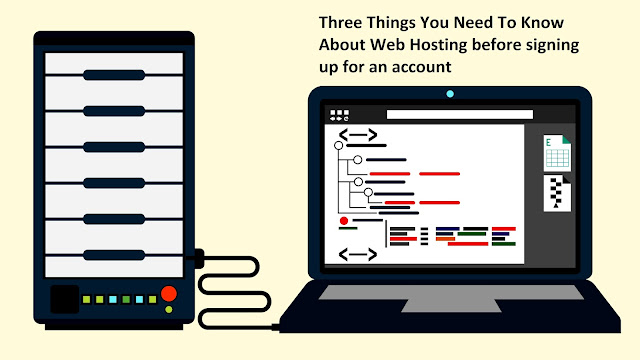Three Things You Need To Know About Web Hosting before signing up for an account
Web hosting is probably the most underappreciated element on the internet. Everything you love to surf the web — podcasts, memes, articles, tweets, websites, online games, Netflix content — lives on servers that someone or a company pays you to keep running so you can access it. In short, web hosting is an invisible yet very important element in the online experience.
If you are considering launching a website, there are some basic aspects of web hosting that you should understand before embarking on the project. While it is relatively easy to sign up and use the website builder software provided by the provider to quickly create an attractive and functional frontend, there are many related terms and concepts that you need to understand well. As you'll see later, some of them are confusing, if not completely contradictory. Here's what you need to know about web hosting before opening an account.
There is a big difference between the types of Hosting
If you've ever spent time on a web hosting provider's website, you've probably seen terms like shared, VPS, dedicated, cloud, WordPress, and reseller. They represent different types of web hosting, but not all web hosting providers offer them all. In addition, these types of hosting have significant differences from each other.
Almost every web hosting provider offers shared hosting, the cheapest form of web hosting. With shared hosting, your website shares its server and server resources with many other sites. If you want to save your web hosting Budget and don't expect a lot of traffic, shared hosting is the right choice. You should expect to pay less than $10 per month for this type of web hosting. This hosting tier is perfect for small sites that don't require a lot of bandwidth. However, since you share resources with other sites, you should be prepared for the occasional drop in speed if one of your friend's sites starts to attract a lot of visitors. There is also free web hosting if you have a limited budget, but this has its own notes such as advertising and very low server specifications.
Large companies that expect a lot of traffic on their sites should choose VPS or dedicated hosting, each of which offers increasingly powerful server specifications. VPS hosting is similar to the high-powered version of shared hosting, only that fewer websites share server resources that are also more separate. VPS hosting is more expensive than shared hosting, but you should pay less than $100 per month.
Difference between Bandwidth and Data Transfer
"Bandwidth" and "data transfer" are often used interchangeably to define the amount of data your website presents to visitors, but actually the two terms have technically different definitions.
Bandwidth represents the total amount of data that can be transferred in one time, while data transfer is the throughput or amount of information that can actually be used in a given period of time—usually in one month. Think of it this way: a web hosting provider may have a maximum bandwidth of 5GB, but depending on your hosting plan, your site may only allow 1GB of data transfer per month.
Note: If your website exceeds a specified monthly data transfer limit due to a spike in traffic from Reddit, for example, your web hosting provider may slow down your site's data transfer speed or charge you a fine. They may even encourage you to upgrade to a higher level of web hosting. It is very important to know the data limits of your site before you face a situation like this.
"Infinite" Is Not Completely Infinite
Web hosting providers will try to tempt you to sign up for their hosting plans with the promise of "unlimited"monthly data storage or transfer. In general, it was not a completely honest agreement. Now, I wouldn't say that these web hosting Providers lie completely, but "unlimited" storage or data transfer claims almost always have limits that vary between companies. For example, FatCow offers "unlimited" disk space and states that there are no restrictions on user content—as long as the person remains in full compliance with the company's terms and conditions and uses the storage "for the normal operation of your FatCow website."This is similar to the principle of Endless Shrimp buffets: in the end, the restaurant will limit you, if they do not run out of shrimp supplies in advance.
"Unlimited" data storage and transfer are usually associated with shared plans or WordPress, and they allow you to act freely... within certain limits. If your blog is getting steady traffic (whatever that means!), You will be in a good position. However, don't expect to be able to upload or stream 50TB of data every day. Ordinary people do not do such things and are likely to engage in dubious activities.
You should consult the terms and conditions of the web hosting provider, or a customer service representative, to find out exactly what you can and cannot do within the scope of the unlimited offer of your plan. For example, DreamHost

Posting Komentar untuk "Three Things You Need To Know About Web Hosting before signing up for an account"